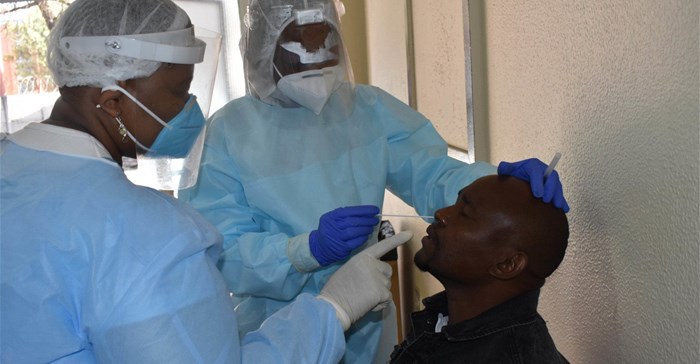
Covid-19 testing at Exxaro operations. Photo: Exxaro
The industry realised early on that its testing approach was going to be risk-based and more rigorous than many other industries, said Tebello Chabana, Minerals Council senior executive: public affairs and transformation. “A very important driver of our approach was to ensure that companies were able to access testing capacity where and when they needed it. To this end, the Minerals Council engaged with a wide range of testing laboratories to establish capacity and ensure access to expanded capacity.
“We are very confident that this approach has made a very substantial difference, not only in ensuring greater testing capacity for mining employees but more broadly in South Africa,” he said.
He also spoke of the importance of collaboration between mining companies, and between the companies and others, in these circumstances.
Testing
Thabo Masike, Seriti Resources chief people officer, whose company has established a joint Covid-19 testing initiative with Exxaro because of the proximity of a number of their respective operations, explained that Seriti was anxious that the company’s 5,500 employees should not lack testing facilities when the pandemic peaked.
That goal was achieved. Some 23% of Seriti employees have been tested at this point. In addition, the company engaged with regional Department of Health offices so that the company’s testing capacity could be used in high incidence areas near its Mpumalanga operations.
Dr Joseph Matjila, Exxaro group manager: health and safety, outlined the two sets of testing facilities his group has established, the one in Mpumalanga with Seriti, and the other a joint venture with Eskom in Limpopo province.
Matjila said the two testing facilities are capable of providing test results within three hours of receiving the swabs to be tested. He believes this has had a major impact on reducing the incidence of Covid-19 at Exxaro operations and surrounding communities, by enabling rapid implementation of contact tracing whenever a positive case is diagnosed, and isolation measures wherever required.
Communities
Gerrit Lotz, vice president: people and organisational effectiveness at Gold Fields’ South Deep Mine said South Deep had resolved early on that all employees should be tested on their return to work. These employees formed one of four categories of individuals tested as part of their ongoing protocols, with the others being those at risk, such as essential service workers; those selected through risk-based sampling; and persons under investigation due to, for example, having self-declared symptoms.
In addition to enabling rapid contact tracing and isolation measures, he said South Deep had used experts to analyse the test results and use the information for predicting which employees were most likely at risk of infection and to provide intensive, targeted education. It also enabled the mine to predict absenteeism trends and bring in replacement employees timeously.
Conroy van der Westhuizen, Glencore Alloys general manager, explained how the company had approached the testing imperative by partnering with the Groblersdal-based Ndlovu healthcare group.
Glencore Alloys funded equipment for Ndlovu capable of carrying out 600-800 tests a day for employees and communities. The equipment, much of which is suited for managing other diseases, such as HIV, has been donated to Ndlovu which will continue using it to carry out its public health work.


































